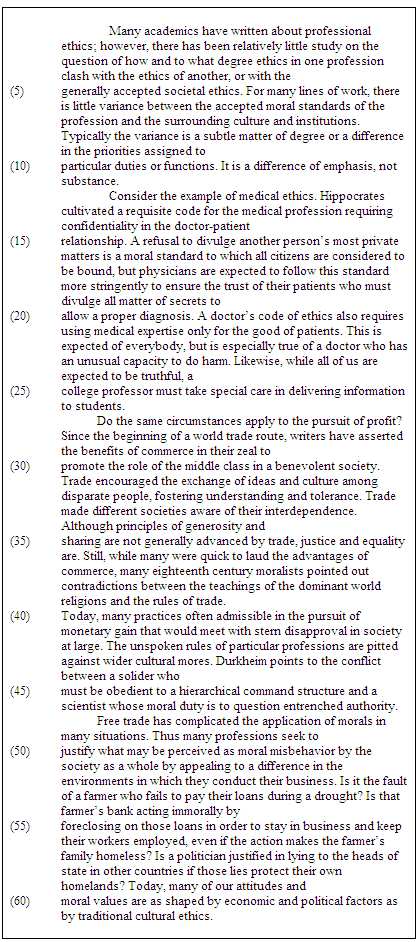Humanities passages typically involve literature, philosophy, ethics and language. Your approach in a humanities passage should not change — you still use the TestSherpa method.
This is the first article in a series of articles about humanities passages in LSAT Reading Comprehension. The series includes:
Humanities Passages in LSAT Reading Comprehension
Some candidates love humanities passages because they were English or Philosophy majors and are used to reading and even writing in that style. Other students find them boring and are intimidating by unfamiliar details, such as references to philosophers and works they’ve never read. In many cases, the structure of a humanities passage may be more convoluted than a natural science passage. You will still be rewarded for recognizing key structural elements in the writing.
Tips for LSAT Humanities Passages
Here are some general tips for attacking humanities passages:
- Don’t be tempted to read humanities passage in more depth just because they contain unfamiliar references or more tortuous logic — the TestSherpa method works just as well for humanities passages as for other types of passages.
- Continue to focus on topic, scope, purpose, topic phrases, key words, main idea, and logical structure.
- Look for passages with topics you might be familiar with. No matter what you’re major was, you undoubtedly took many humanities courses in your undergraduate career. Even if you disagree with the author, having some familiarity with the topic can only help.
- Don’t be thrown by references to people, places, ideas and writings you’ve never heard of — your job is not to memorize, this is an open book test. You can always look up details later.
- Relax and let unfamiliar ideas and phrases go by without worrying about them. Treat them as you would a detail in a science passage. Just try to get a feel for the main idea in each paragraph then underline key topic phrases that will help you form your outline.
TestSherpa Process for Reading Comprehension
Before seeing our sample passage, let’s review the TestSherpa process for Reading Comprehension:
(1) Read the first paragraph and guess at main idea, scope and tone
(2) Read the rest of the passage and build an outline
(3) Confirm your outline
(4) Tackle the questions
Next, use this technique for the following passage.
Sample LSAT Humanities Passage
Take about eight (8) minutes to read the following passage and answer the questions before moving to the explanations.

1. The author’s main purpose in the passage is to
(A) question the validity of free market ethics.
(B) argue that there is little difference between society’s morals and the ethics binding a particular profession.
(C) demonstrate that professional ethics compete with societal ethics in the creation of a system of values.
(D) argue that medical ethics are both simpler and superior to business ethics.
(E) describe various ethical systems that shape our moral and cultural attitudes.
2. According to the passage, most people would consider all of the following to be moral standards regardless of their profession, EXCEPT:
(A) Keeping secret a person’s private matters.
(B) Telling the truth.
(C) Using one’s expertise for good.
(D) Insisting on obedience to hierarchical structures.
(E) Refusing to inflict intentional harm on another.
3. According to the author, trade had a beneficial influence in
(A) promoting tolerance and understanding.
(B) encouraging generosity.
(C) synthesizing religious morals.
(D) fostering the role of the middle class in a benevolent society.
(E) shaping our attitudes and moral values.
4. The author implies which of the following?
(A) The values of generosity and sharing are not as important as tolerance and understanding.
(B) Societies have always had a degree of interdependence, with or without trade.
(C) Many cultures lacked justice and equality before the introduction of trade.
(D) The duties of a soldier are more important to a society than the duties of a researcher.
(E) Trade has influenced the teachings of the world’s religions.
5. The author refers to Durkheim in the second paragraph primarily to
(A) contrast medical ethics with research ethics.
(B) argue that unspoken professional ethics have a higher moral authority than wider cultural mores.
(C) demand that society have a greater sense of obedience to hierarchical structures.
(D) demonstrate that no two professions share the same unspoken rules.
(E) show how two professions can have conflicting ethical standards.
6. The author views the role of economic and political factors as
(A) more important in the formation of ethical systems than the role of traditional cultural ethics.
(B) a factor in the development of medical ethics.
(C) influential in the development of social values and occasionally in conflict with traditional ethical values.
(D) in conflict with each other.
(E) a set of ethics that is often perceived as moral misbehavior by society in general.
After you try this passage on your own, take a look at how we formed a road map of this passage in LSAT Reading Comp Outlines for Humanities.

